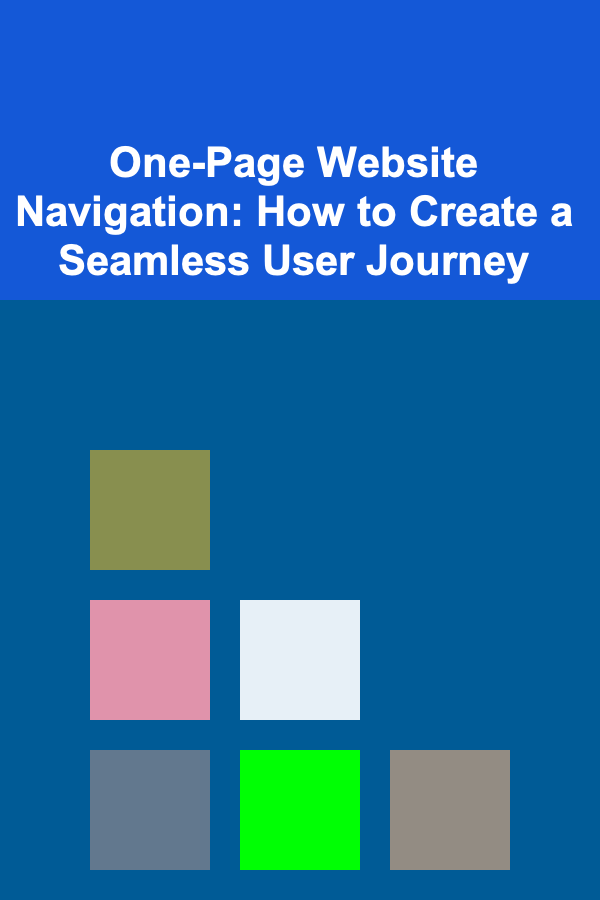
The Pros and Cons of Using a One-Page Website for Your Business
ebook include PDF & Audio bundle (Micro Guide)
$12.99$10.99
Limited Time Offer! Order within the next:

In the world of web development, one-page websites have risen in popularity, especially for businesses looking to streamline their online presence. These websites are compact, offering users a concise and direct experience by presenting all essential information on a single page. Whether for small businesses, portfolios, event pages, or personal projects, one-page websites are a practical solution. However, like any business decision, they come with their own set of advantages and challenges. This article will explore the pros and cons of using a one-page website for your business and provide insights into whether it's the right choice for your brand.
What Is a One-Page Website?
A one-page website is a type of website where all the content is displayed on a single webpage, as opposed to multiple pages with separate URLs. These websites typically use a scrolling layout, where users navigate through various sections of content without needing to load a new page. The sections are often linked with anchor links, allowing users to jump to specific areas of the page without having to scroll manually. One-page websites are most often used for specific purposes such as landing pages, product promotions, and personal portfolios.
The simplicity and compact nature of one-page websites offer both design and functionality advantages. However, to effectively assess whether a one-page website is suitable for your business, we must examine the pros and cons in more detail.
The Pros of Using a One-Page Website for Your Business
1. Simplicity and User Experience
A one-page website's most significant advantage lies in its simplicity. By consolidating all your content into a single page, it creates an easy-to-navigate experience for visitors. Users don't need to worry about clicking through multiple pages, which can sometimes be a source of frustration. With one-page websites, everything is at the user's fingertips, creating a seamless journey from start to finish.
This simplicity is especially beneficial for businesses aiming to communicate a single message or goal. Whether you're promoting a product, an event, or a service, a one-page website can allow you to focus solely on that message without distracting users with unnecessary information.
2. Mobile-First Design
In today's digital age, mobile-friendly websites are no longer a luxury but a necessity. A one-page website is inherently mobile-friendly due to its compact design. All content is displayed on one page, making it easy to scroll through and navigate on smaller devices. The linear flow from one section to another means there are fewer elements competing for attention, leading to a cleaner and more user-friendly mobile experience.
Given the growing use of mobile devices for browsing and shopping, a one-page website offers significant advantages in terms of user experience on smartphones and tablets. A single-page design also reduces the complexity of creating separate mobile and desktop versions of a website.
3. Faster Load Times
Because one-page websites contain less content and fewer elements, they generally load faster than multi-page websites. With all the information on a single page, there are fewer HTTP requests to make, reducing the server load and improving overall speed. Faster load times lead to better user engagement and lower bounce rates, which can translate into higher conversion rates and better user satisfaction.
Faster load times are particularly important for mobile users, as they often experience slower internet speeds compared to desktop users. A one-page website helps mitigate this issue, ensuring that users are not waiting for pages to load, which can lead to frustration.
4. Better Focus on a Single Goal
A one-page website is ideal for businesses with a singular goal or action in mind. Whether you're promoting a product, offering a service, or advertising a special event, a one-page website allows you to direct visitors' attention toward that single objective. The website's design, content, and calls-to-action (CTAs) are all aligned around one clear goal, minimizing distractions and increasing the likelihood of conversion.
For example, if you're launching a new product, you can use a one-page website to provide detailed information about the product, display testimonials, and include a clear CTA for users to purchase. There are no extra pages to click through, so users are more likely to follow through with the desired action.
5. Cost-Effective and Easy to Maintain
For small businesses, startups, and individual entrepreneurs, building and maintaining a website can be costly. One-page websites are generally more affordable to design and develop than multi-page websites because there's less content to create and less complexity involved. As a result, businesses with limited budgets can often opt for a one-page design without sacrificing the quality of the user experience.
Moreover, a one-page website is easier to maintain. Since all the content resides in one location, there's no need to constantly update multiple pages or worry about maintaining links between different sections. This can save both time and money in the long run.
6. Improved SEO for Targeted Keywords
While SEO (Search Engine Optimization) for one-page websites can be challenging, it's not impossible. One-page websites allow for better optimization for a few targeted keywords. By focusing all your content around specific search terms, you can optimize the page effectively for SEO. You can use headings, meta descriptions, and image alt texts to improve rankings for those targeted keywords.
Additionally, having a single page to rank for means you can focus all your SEO efforts on a limited number of terms, which can improve your website's performance for those particular keywords. For businesses aiming for niche markets or specific products, a one-page website is often easier to rank on search engines for targeted terms.
The Cons of Using a One-Page Website for Your Business
While there are many advantages to a one-page website, it's not without its limitations. Here are some of the drawbacks that businesses should consider before opting for a one-page design.
1. Limited Scalability
One of the most significant downsides of a one-page website is its limited scalability. As your business grows and you need to add more content---such as blog posts, case studies, product pages, or team members---it becomes more difficult to organize and present this information on a single page. One-page websites are best suited for small businesses or startups with a limited amount of content to present. As your offerings expand, you might outgrow the structure and require a multi-page site.
This is especially true for businesses with complex services or large product catalogs, as one-page websites can quickly become cluttered and overwhelming if too much information is crammed into a single page.
2. SEO Challenges for Broader Keywords
While a one-page website can be optimized for a few specific keywords, it's much more challenging to rank for multiple broad keywords on a single page. Multi-page websites allow for multiple pieces of content, each targeting different keywords, and give you more opportunities to rank on search engines.
In contrast, a one-page website can struggle to rank for more competitive or broad keywords because you only have one page to include all your SEO efforts. This can limit your ability to appear in search results for a wide range of terms, especially if your business has diverse offerings that cannot be easily consolidated into one page.
3. Not Ideal for Complex User Journeys
A one-page website is often best suited for businesses with simple offerings and straightforward goals. However, businesses with complex products or services that require multiple touchpoints and detailed information may find one-page websites limiting. For instance, if you're offering a range of services, you might want to provide detailed case studies, pricing information, and testimonials on separate pages to cater to different user needs.
A one-page website can become cluttered if you try to fit too much information into it. This can detract from the user experience and make it harder for users to navigate through the information they need to make informed decisions.
4. Difficult to Implement Advanced Features
For businesses that need advanced features---such as e-commerce functionality, user accounts, or a blog---one-page websites can be limiting. While some of these features can be integrated into a one-page site, it often requires complex coding and customization, which can make the website less stable and harder to maintain.
If your business needs to implement these advanced features, a multi-page website might be more suitable. Multi-page websites offer more flexibility to incorporate a wider range of features and provide users with the ability to interact with different parts of the site without overwhelming them.
5. Analytics and Tracking Can Be More Difficult
With a multi-page website, it's easier to track specific user behavior on individual pages. You can monitor which pages get the most visits, how users interact with them, and which content is most popular. However, with a one-page website, tracking becomes a bit more complicated, as all the content exists on a single page. While it's still possible to use analytics tools, the insights you gain might be less granular than those from a multi-page site.
This can make it harder to understand user behavior and identify areas where you need to improve or optimize content. If your business requires detailed analytics to improve your marketing strategies, a one-page website might limit your ability to gather the insights you need.
Conclusion
One-page websites offer a compelling and streamlined solution for businesses with simple goals, a limited amount of content, and a need for fast load times. The simplicity, ease of navigation, and cost-effectiveness make it an attractive choice for many small businesses and entrepreneurs. However, businesses with complex offerings, a need for advanced features, or a broader SEO strategy may find the limitations of a one-page website prohibitive.
Ultimately, the decision to use a one-page website should be based on your specific business goals, the scale of your operations, and the user experience you want to provide. For businesses that prioritize simplicity, speed, and a focused user journey, a one-page website can be an excellent choice. However, for those looking to scale, provide in-depth information, and rank for multiple keywords, a multi-page website may be the better option. By weighing the pros and cons carefully, you can make an informed decision that aligns with your business objectives.
Reading More From Our Other Websites
- [Personal Care Tips 101] How to Wear Perfume Without Overpowering Your Senses
- [Home Staging 101] How to Create a Cozy and Inviting Home with Staging
- [Home Family Activity 101] How to Organize a Family Game Night That Keeps Everyone Entertained
- [Personal Care Tips 101] How to Create Soap Recipes for Different Skin Conditions
- [Organization Tip 101] How to Create an Outdoor Space That Attracts Shoppers
- [Personal Finance Management 101] How to Use Cash-Back Rewards Strategically to Maximize Your Savings
- [Home Cleaning 101] How to Clean and Care for Leather Furniture
- [Organization Tip 101] How to Encourage Teamwork in Family Projects
- [Stamp Making Tip 101] From Sketch to Stamp: Designing and Printing Your Own Watercolor Motifs
- [Home Budget 101] How to Budget for Home Insurance: A Step-by-Step Guide

How to Maintain the Condition of Luxury Leather Goods
Read More
How to Prevent Echoes in Your Home with Soundproofing Tips
Read More
Moral Psychology: Understanding the Nature and Function of Moral Reasoning
Read More
One-Page Website Navigation: How to Create a Seamless User Journey
Read More
How To Understand Facial Recognition Technology and Privacy
Read More
10 Tips for Buying Antique Clocks Online
Read MoreOther Products

How to Maintain the Condition of Luxury Leather Goods
Read More
How to Prevent Echoes in Your Home with Soundproofing Tips
Read More
Moral Psychology: Understanding the Nature and Function of Moral Reasoning
Read More
One-Page Website Navigation: How to Create a Seamless User Journey
Read More
How To Understand Facial Recognition Technology and Privacy
Read More